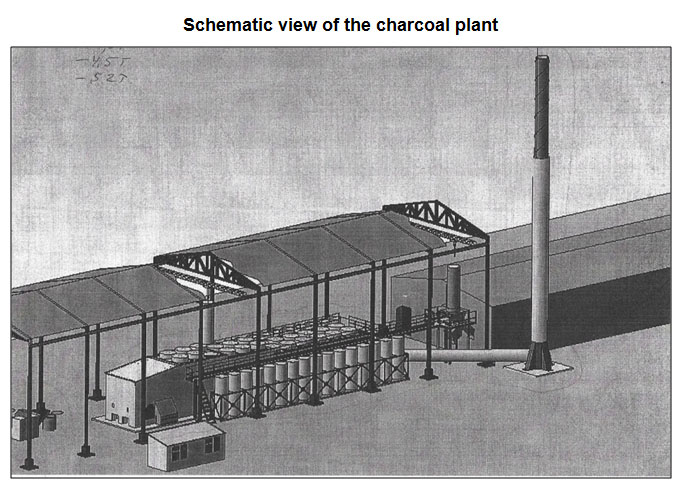Modern charcoal making plant, using the Russian technology
During 21st century, sustainable development has become a major issue with energy saving & environmental-friendly technologies. Charcoal has become a new source of energy again.
A Russian engineering company offers the modern charcoal making plants & set up several units in Russia & Europe, using the most modern technology. The advantages of the new technology include higher yield of charcoal, rapid carbonization & no pollution to the environment.
Since the Russian technology can make very high quality charcoal with 75-88% fixed carbon, the charcoal can be used for smokeless barbeque applications, where the prices are high.
Charcoal has excellent cooking properties. It burns evenly for a long time & can be easily extinguished & re-heated. It is desired for the flavours it imports for grilled food. It is widely used in barbecue fuel market, where it has no competition.
Apart from other industrial applications,charcoal is widely used for making activated carbon. Activated carbon is used in water purification, gas purification, de-chlorination, waste water treatment & cigarette filters. Activated carbon is also used for water filtration in breweries, de-colorization of cane sugar solutions, in pharmaceutical solutions, treatment of gases &vapours, gas masks, de-sulphurisation of gas, additives in rubber tyres etc. Strict legislations on water & air pollution control have been a great stimulant to the activated carbon market and this trend is expected to continue.
The World charcoal market size was 45 million tons in 2005. With the development of charcoal industry & the increasing legislation concerned with the control of environment, the application of charcoal for purification of industrial wastes has increased markedly in the recent years.
The European production of charcoal was only 2.31 million tons in 2005. Charcoal is widely used in Europe in ferro-silicon industry & in activated carbon, apart from domestic applications for barbecue. Other major importing countries of charcoal include Japan, Korea, Singapore, Taiwan & Gulf regions. There is a world-wide shortage of charcoal.
Consumers mainly burn lump barbecue charcoal in Europe. The European market is today strongly influenced by the requirements for certification of the charcoal supplied there. Proof of social, environmental & ecological sustainability of the charcoal industry is essential in the European market.
The new charcoal making process from Russia includes the following –
- Wood pieces / bamboo are cut into the required size.
- They are subsequently dried in the same kiln, which uses the surplus heat from the carbonisation process.
- The dried wood pieces/ bamboo pieces are loaded on to the charcoal making kiln. After carbonisation, the size of the charcoal shrinks by 20-30%.
- Finally, the charcoal is screened & packed in 1 ton jumbo bags or in small paper bags / polypropylene packs with producer’s / trader’s logo. These small bags of 3-15 kgs will be delivered to the customers. The non-screened charcoal normally contains 80% of 20-80 mm size, 10% of 10-20 mm size & 10% of less than 10 mm size.
In the Russian technology, the kilns can make the dream of western owner’s fire places – “coal logs”, fully preserving the shape of the starting wood / bamboo. The technology allows widely varying content of fixed carbon, the shape & size of charcoal.

The Russian engineering company is particularly proud of the fact that the modern charcoal making plant is an environmentally-friendly process, with no harmful emissions into the environment. The basic principle of their design is that the wood / bamboo are placed in the oven through removable retorts with special devices and steam & gas are removed from the furnace. These gaseous and liquid products of the decomposition of wood / bamboo are completely burned. Thus, no harmful products are released into the air.
Steam and gas formed during the pyrolysis pass through the drying section of the furnace, and subsequently the heat is released into the chimney. In composition, the gas is not different from the smoke produced in home wood-stove. The concentrations of harmful components of NOx and CO are far below the acceptable levels. The installation has no fans and no pressure blowers. The entire process takes place due to the natural chimney draft. There is no need for any electricity except lighting, mechanical wood / bamboo cutting and hoist or crane with a lifting capacity of 3.5 tons.
Besides furnace and hoist installation, the design includes charcoal storage area with packing, forklift, platform for preparation of raw materials with a saw and cutter, support stands and a device for loading and unloading of retorts.

The Russian engineering company will provide all the designs & engineering services and also the supervision of erection & commissioning. Charcoal kiln & other equipments are fabricated at site, while some equipment such as wood / bamboo cutter & packing machines are imported from Europe.
The charcoal plants can be constructed in capacities from 600 tons to 1,800 tons per year. The project needs 1-3 acres of land & 15 – 30 labourers & staff. The total investment is from Rs. 2 -3.50 crores including land, buildings, plant & machineries and Rs. 0.5-1.50 crores for working capital. The yearly turnover is Rs. 2 – 6 crores & the pay-back period is 2 – 3 years.
